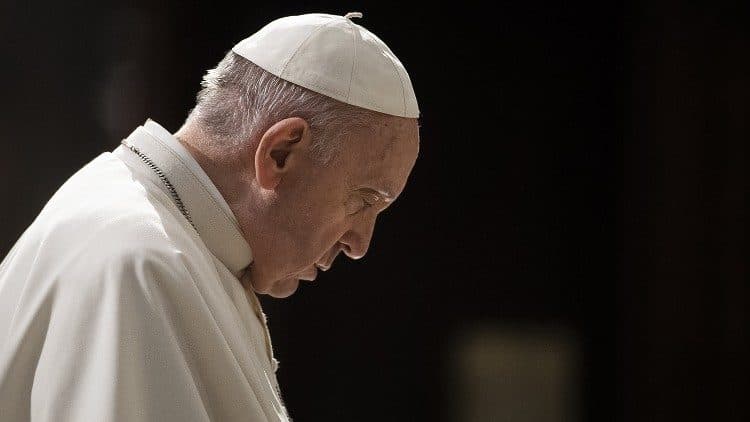ROME – Amid concerns about possible labor unrest during the looming Jubilee Year, an association representing the Vatican’s lay employees has distanced itself from a recent anonymous media interview complaining bitterly about Pope Francis’s financial management, while nevertheless confirming mounting “tension and dissatisfaction” among the pope’s workforce.
The widely read Italian publication Panorama carried a Dec. 12 interview with a Vatican employee identified by the false initials “G.F.”, complaining that working in the Vatican today has become “an act of pain” and a “via crucis.”
“If you ask for a raise, you risk excommunication,” he said. “If you want to be paid for overtime, they look at you like a trouble-maker.”
G.F. predicted that Vatican employees would begin “mobilizing” to voice their discontent shortly after Pope Francis opens the Holy Door of St. Peter’s Basilica to mark the official beginning of the jubilee, though he ruled out the idea of a full strike, since Vatican labor law doesn’t recognize a right to strike.
He asserted that since 2014, the salaries of Vatican personnel have lost a third of their purchasing power, while Vatican-owned apartments, once virtually part of the benefits package for the workforce, have now become so expensive few employees have one. It’s also become increasingly more difficult to use the Vatican’s health system, he claimed.
Panorama and its parent publication, the daily newspaper Verità, both have a conservative editorial orientation, so it’s not surprising that some of the criticism seemed to have an ideological overlay.
“You can’t move up unless you’re a friend of one of the two lobbies that count: Either the ‘gay lobby,’ which is extensive and very powerful, or the ‘Santa Marta Club’ around the pope,” G.F. said.
Of the latter, G.F. said, “If you want to join, you can’t read newspapers of the center-right and you have to speak Spanish … You have to be green, pro-migrant and, above all, pro-Palestinian. For them, Nicolas Maduro is a saint and Donald Trump is a devil.”
“You also have to pay attention to the sudden changes in Bergoglio’s humors and opinions,” he said.
G.F. asserted that since Francis became pope, financial information has been kept “top secret” despite pledges of solidarity. He said traditional decision-makers, such as the Secretary of State, Italian Cardinal Pietro Parolin, have been shoved aside in favor of a handful of Spanish-speaking papal favorites: Jesuit Father Juan Antonio Guerrero Alves, former head of the Vatican’s Secretariat for the Economy; Maximino Caballero Ledo, a Spanish business executive and current head of the secretariat; and Luis Herrera Tejedor, a Spanish layman and director of the Vatican’s Human Resources office.
“In recent years, we’ve had the impression that Pope Francis governs Vatican finances with suspicion and partiality,” G.F. said. “We’re state employees who do piecework, required to shut up and show absolute obedience.”
“Working for the Vatican today isn’t worth it, either for the salary or the profession,” he said.
G.F. added a comparison between Francis and the last pope to preside over a major Jubilee Year.
“For the 2000 jubilee, John Paul II gave everyone a bonus of €1,000, without distinction, while now Pope Francis has announced cuts to our pensions,” he said, “It’s not hard to see the difference.”
In a statement shortly after the article appeared, the Association of Lay Vatican Employees, the closest thing in the Vatican to a labor union, said that such commentary, employing “very harsh tones” and offered anonymously, “does nothing other than to create confusion and to throw employees into panic.”
The association said it desires “direct and frank dialogue” with Vatican authorities, not indirect attacks in the press.
On the other hand, the association also appeared to suggest that the Vatican itself bears some responsibility for creating the present climate.
“In fact, the lack of transparency, above all on the matters of work and economy/finances, is deleterious and leads to the hardening of hearts,” it said. “It’s a fact that many in the Vatican are concerned about possible cuts to salaries and pensions, especially in conjunction with an increase in the workload for the Jubilee.”
In that light, the statement urged recognition of “a real role of mediation and protection of Vatican workers for the association.”
“We hope this legitimization will occur quickly,” the statement said. “considering the worrying increase in the climate of tension and dissatisfaction among employees.”
Pope Francis has written three letters to cardinals in recent months describing the Vatican’s financial woes, most recently a Nov. 19 missive on the pension system.
“In real terms, the current system is not able to guarantee in the medium term the fulfilment of the pension obligation for future generations,” the pontiff wrote, saying “urgent structural measures” will require “generosity and willingness to sacrifice on the part of all.”










